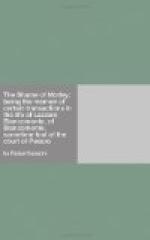“Let us cease these pleasantries, I entreat you,” I laughed. “Saints defend me! If your mood incline to raillery you’ll find your match in some lad of the stables. As for me, I have not the time, had I the will, to engage you further. Let me remind you that I would be gone.”
The reminder was well-timed. He bethought him of the journey I must go, on which he was charged to see me safely started.
“Come on, then,” he growled, in a white heat of passion that was only curbed by the consideration of that slender, pale young cardinal, his master.
Still, some of his rage he vented in roughly taking me by the collar of my doublet, and dragging the almost headlong from the room, and so a-down a flight of steps out into the courtyard. Meet treatment for a Fool—a treatment to which time might have inured me; for had I not for three years already been exposed to rough usage of this kind at the hands of every man above the rank of groom? And had I once rebelled in act as I did in soul, and used the strength wherewith God endowed me to punish my ill-users, a whip would have reminded me into what sorry slavery had I sold myself when I put on the motley.
It had been snowing for the past hour, and the ground was white in the courtyard when we descended.
At our appearance there was a movement of serving-men and a fall of hoofs, muffled by the snow. Some held torches that cast a ruddy glare upon the all-encompassing whiteness, and a groom was leading forward the horse that was destined to bear me. I donned my broad-brimmed hat, and wrapped my cloak about me. Some murmurs of farewell caught my ears, from those minions with whom I had herded during my three days at the Vatican. Then Messer del’ Orca thrust me forward.
“Mount, Fool, and be off,” he rasped.
I mounted, and turned to him. He was a surly dog; if ever surly dog wore human shape, and the shape was the only human thing about Captain Ramiro.
“Brother, farewell,” I simpered.
“No brother of yours, Fool,” snarled he.
“True—my cousin only. The fool of art is no brother to the fool of nature.”
“A whip!” he roared to his grooms. “Fetch me a whip.”
I left him calling for it, as I urged my nag across the snow and over the narrow drawbridge. Beyond, I stayed a moment to look over my shoulder. They stood gazing after me, a group of some half-dozen men, looking black against the whiteness of the ground. Behind them rose the brown walls of the rocca illumined by the flare of torches, from which the smell of rosin reached my nostrils as I paused. I waved my hat to them in token of farewell, and digging my spurless heels into the flanks of my horse, I ambled down through the biting wind and drifting snow, into the town.
The streets were deserted and dark, save for the ray that here fell from a window, and there stole through the chink of a door to glow upon the snow in earnest of the snug warmth within. Silence reigned, broken only by the moan of the wind under the eaves, for although it was no more than approaching the second hour of night, yet who but the wight whom necessity compelled would be abroad in such weather?




